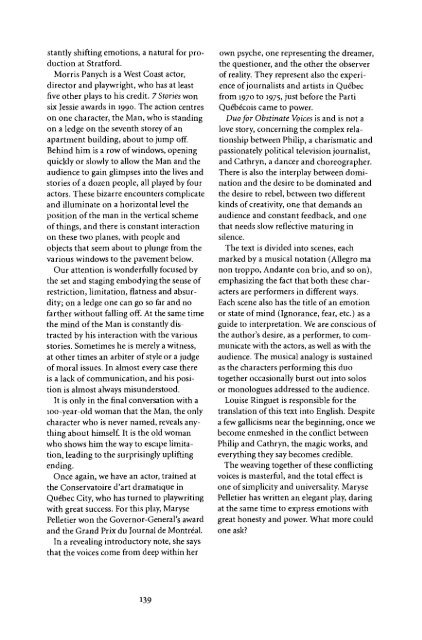To All Appearances A Lady - University of British Columbia
To All Appearances A Lady - University of British Columbia
To All Appearances A Lady - University of British Columbia
Create successful ePaper yourself
Turn your PDF publications into a flip-book with our unique Google optimized e-Paper software.
stantly shifting emotions, a natural for production<br />
at Stratford.<br />
Morris Panych is a West Coast actor,<br />
director and playwright, who has at least<br />
five other plays to his credit. 7 Stories won<br />
six Jessie awards in 1990. The action centres<br />
on one character, the Man, who is standing<br />
on a ledge on the seventh storey <strong>of</strong> an<br />
apartment building, about to jump <strong>of</strong>f.<br />
Behind him is a row <strong>of</strong> windows, opening<br />
quickly or slowly to allow the Man and the<br />
audience to gain glimpses into the lives and<br />
stories <strong>of</strong> a dozen people, all played by four<br />
actors. These bizarre encounters complicate<br />
and illuminate on a horizontal level the<br />
position <strong>of</strong> the man in the vertical scheme<br />
<strong>of</strong> things, and there is constant interaction<br />
on these two planes, with people and<br />
objects that seem about to plunge from the<br />
various windows to the pavement below.<br />
Our attention is wonderfully focused by<br />
the set and staging embodying the sense <strong>of</strong><br />
restriction, limitation, flatness and absurdity;<br />
on a ledge one can go so far and no<br />
farther without falling <strong>of</strong>f. At the same time<br />
the mind <strong>of</strong> the Man is constantly distracted<br />
by his interaction with the various<br />
stories. Sometimes he is merely a witness,<br />
at other times an arbiter <strong>of</strong> style or a judge<br />
<strong>of</strong> moral issues. In almost every case there<br />
is a lack <strong>of</strong> communication, and his position<br />
is almost always misunderstood.<br />
It is only in the final conversation with a<br />
100-year-old woman that the Man, the only<br />
character who is never named, reveals anything<br />
about himself. It is the old woman<br />
who shows him the way to escape limitation,<br />
leading to the surprisingly uplifting<br />
ending.<br />
Once again, we have an actor, trained at<br />
the Conservatoire d'art dramatique in<br />
Québec City, who has turned to playwriting<br />
with great success. For this play, Maryse<br />
Pelletier won the Governor-General's award<br />
and the Grand Prix du Journal de Montréal.<br />
In a revealing introductory note, she says<br />
that the voices come from deep within her<br />
own psyche, one representing the dreamer,<br />
the questioner, and the other the observer<br />
<strong>of</strong> reality. They represent also the experience<br />
<strong>of</strong> journalists and artists in Québec<br />
from 1970 to 1975, just before the Parti<br />
Québécois came to power.<br />
Duo for Obstinate Voices is and is not a<br />
love story, concerning the complex relationship<br />
between Philip, a charismatic and<br />
passionately political television journalist,<br />
and Cathryn, a dancer and choreographer.<br />
There is also the interplay between domination<br />
and the desire to be dominated and<br />
the desire to rebel, between two different<br />
kinds <strong>of</strong> creativity, one that demands an<br />
audience and constant feedback, and one<br />
that needs slow reflective maturing in<br />
silence.<br />
The text is divided into scenes, each<br />
marked by a musical notation (<strong>All</strong>egro ma<br />
non troppo, Andante con brio, and so on),<br />
emphasizing the fact that both these characters<br />
are performers in different ways.<br />
Each scene also has the title <strong>of</strong> an emotion<br />
or state <strong>of</strong> mind (Ignorance, fear, etc.) as a<br />
guide to interpretation. We are conscious <strong>of</strong><br />
the author's desire, as a performer, to communicate<br />
with the actors, as well as with the<br />
audience. The musical analogy is sustained<br />
as the characters performing this duo<br />
together occasionally burst out into solos<br />
or monologues addressed to the audience.<br />
Louise Ringuet is responsible for the<br />
translation <strong>of</strong> this text into English. Despite<br />
a few gallicisms near the beginning, once we<br />
become enmeshed in the conflict between<br />
Philip and Cathryn, the magic works, and<br />
everything they say becomes credible.<br />
The weaving together <strong>of</strong> these conflicting<br />
voices is masterful, and the total effect is<br />
one <strong>of</strong> simplicity and universality. Maryse<br />
Pelletier has written an elegant play, daring<br />
at the same time to express emotions with<br />
great honesty and power. What more could<br />
one ask?<br />
139

















